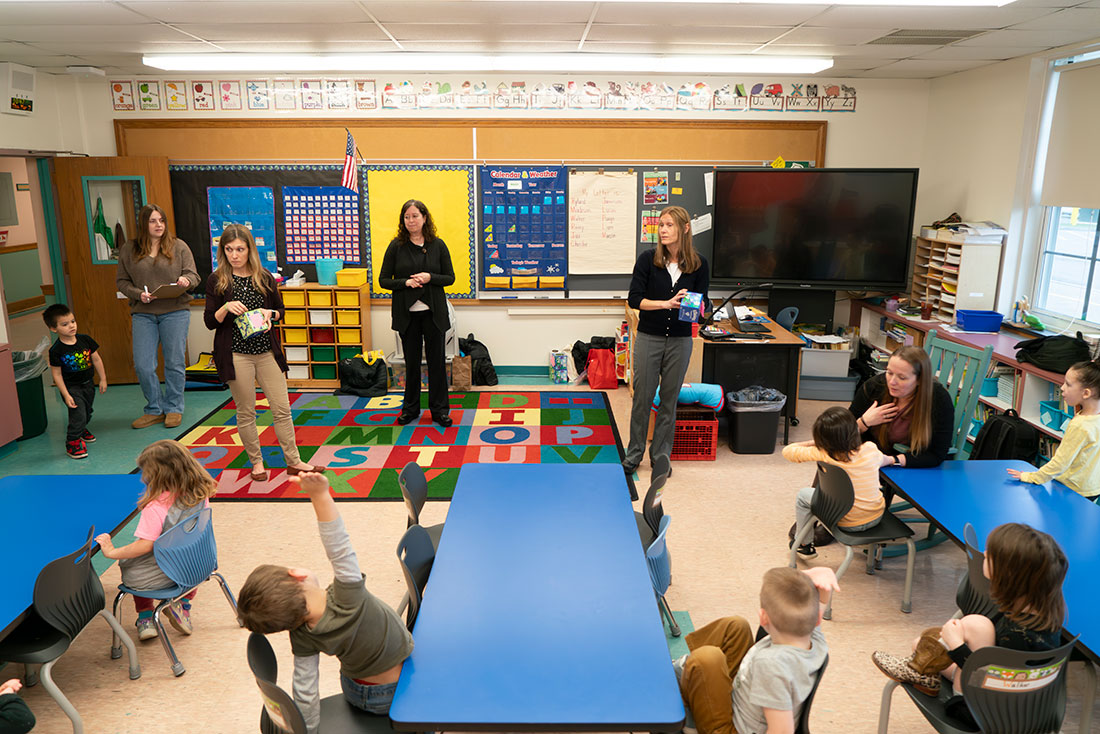
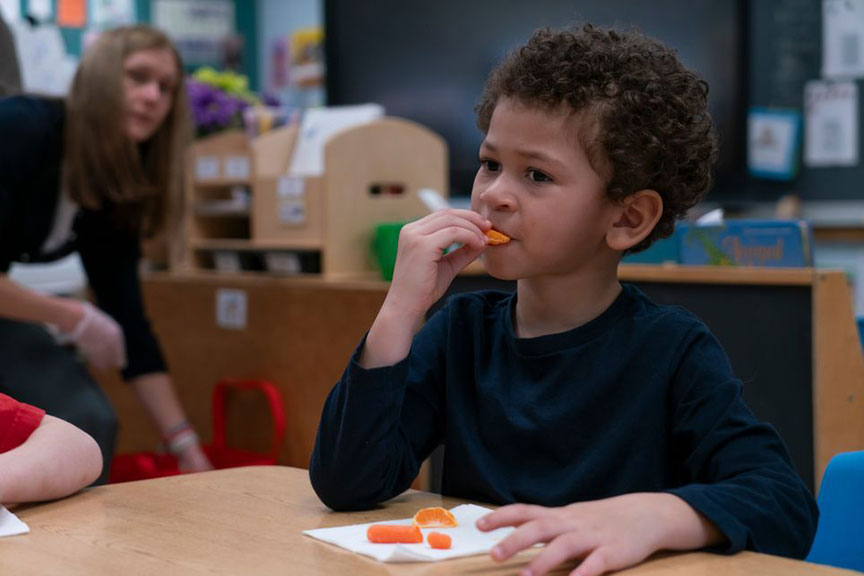
Do you like broccoli?
“I touched broccoli with my feet.”
You like eating watermelon, what does it smell like?
“Snow.”
What does snow taste like?
“Broccoli.”
Welcome to a Universal Pre-Kindergarten (UPK) Age 4 classroom at Elbridge Elementary School in Elbridge, New York, where it’s true that kids say the darndest things but with their five senses – sight, smell, hearing, taste and touch – they’re also learning healthy eating habits through the Mindfully Growing program.
The program’s curriculum is being taught by a team of professors and students from Syracuse University who throughout this school year have been visiting the UPK Age 4 classrooms at Elbridge Elementary on Thursday mornings. On the morning where broccoli was on the children’s minds, professors Lynn Brann and Rachel Razza and doctoral student Kristen Davis focused on touch as they hid baby carrots, clementines, and pea pods in a box and the children used their sense of touch to guess what they were.
After the food was pulled from the box, the children were able to taste it and discover that this healthy stuff isn’t so bad after all.
“The program is getting the students in touch with different ways to experience food,” Davis says. “They’re seeing food in a different way, connecting with where it comes from and ways they can slow down and enjoy it.”
Slowing down and enjoy the food is where the “mindfully” part of the Mindfully Growing program comes into play. The nutrition component is paired with mindfulness practices, which can foster greater empathy and communication skills, improve focus and attention, reduce stress, and enhance creativity and general well-being.
“It works because the kids get excited about being included in activities that their friends are enjoying,” says Elbridge UPK Age 4 teacher Mark MacLachlan. “So, when they are offered to try raw shell peas with all of their friends at school, it’s an easy sell.
“Most of the kids really enjoyed them, too,” MacLachlan adds.
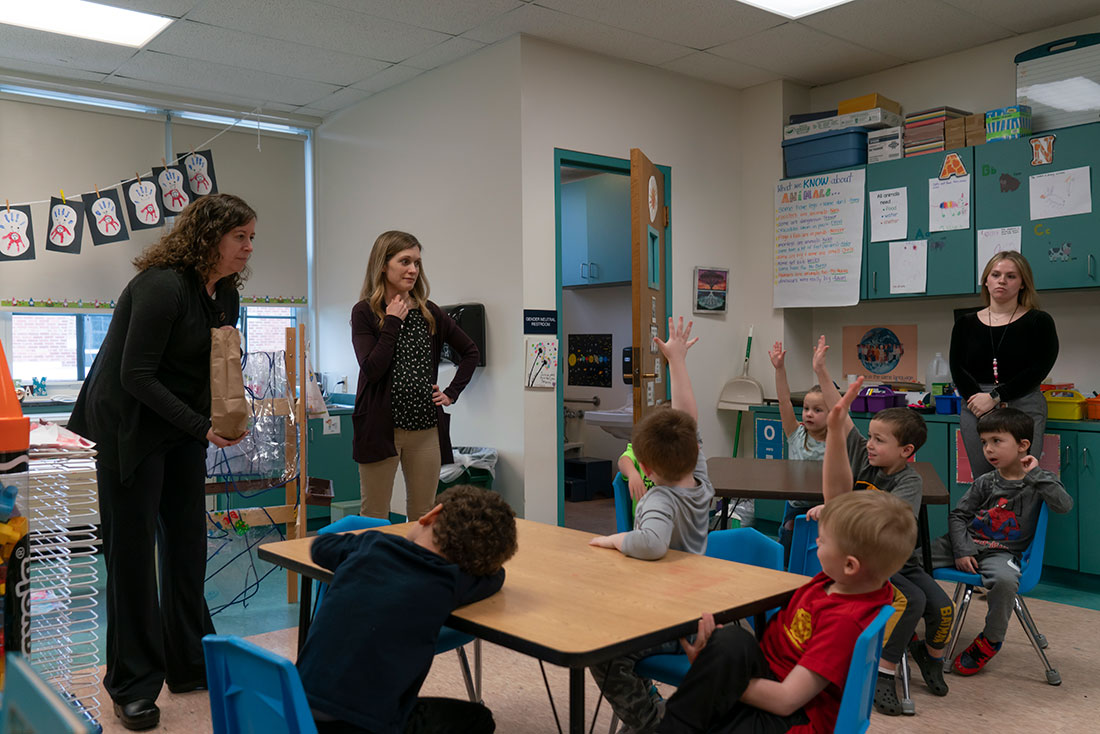
A Mindful Journey
The Mindfully Growing curriculum was created by Brann, associate professor and Chair of the Department of Nutrition and Food Studies at Syracuse University’s Falk College of Sport and Human Dynamics, and Razza, associate professor and chair of the Department of Human Development and Family Science (HDFS) at Falk College whose research focuses on the benefits of mindfulness-based programs for promoting resilience in schools and communities.
The initiative is funded by the Pediatric Nutrition Practice Group of the Academy of Nutrition and Dietetics, and Brann and Razza recently received a grant from the MetLife Foundation through the Syracuse University’s Lender Center for Social Justice to ensure the curriculum resonates with marginalized populations.
Brann says the curriculum is focused on 4-year-olds because it’s trying to get young children to develop an understanding of where food comes from and increase their acceptance of a variety of foods before they get set in their ways. The 10 lessons start with the origin of plants, fruits and vegetables, moves into using senses to explore foods, and finishes with lessons on hunger vs. fullness and sharing food together.
“It’s a good time to get them to explore food, and we do a tasting pretty much every lesson so they get an opportunity to try something new,” Brann says. “With this group, almost every one of them has tasted the food and several of them have asked for more, which is pretty exciting to see them being so open to it.”
Razza says with preschool children ages 3-5, there’s a significant increase in executive function skills, so they’re better able to delay gratification and inhibit their impulses. Thus, the interventions offered by the Mindfully Growing curriculum are important to introduce to this group of students.
“Can they control their impulses and self-regulate overall and also in the food context?” Razza says. “Lynn and I have been working to determine the overlaps between these two areas and how can we use intervention to simultaneously enhance both of them.”
While Brann, Razza, and Davis are with one UPK class for 30 minutes, the other class is having a 30-minute yoga lesson with yoga instructor Colleen Smith from BeLive Yoga and undergraduate student Christina McCord from Falk College’s School of Social Work. Smith, who has been teaching yoga and mindfulness to preschool children in the Jordan-Elbridge Central School District for several years, helped connect Brann and Razza to Superintendent James Froio and Elementary School Principal Brooke Bastian because, as Smith says, she “continues to be impressed by their support of students and their willingness to offer yoga and programs or events that supplement the students’ daily education.”
In her yoga sessions, Smith says she helps the children learn how to self-regulate their bodies, breath, and even emotions as she tries to “meet the children where they are” by matching their energy level and then bringing them to a brief time of rest.
“One thing that can be difficult for them is trying new experiences and foods,” Smith says. “The yoga and mindfulness lessons can help children pay attention to their bodies, thoughts and breath in the moment so they can self-regulate and make healthy and appropriate choices when presented with new or challenging experiences like a mindful eating lesson.”
Bastian, who’s in her fourth year as principal and 11th in the district, says Elbridge Elementary School has a unique UPK program because it offers a full day for both 3- and 4-year olds. Bastian says she and the teachers have enjoyed the partnership with Syracuse because they know the positive impacts that early intervention can have on students.
“Mindfulness is a focus in UPK to help promote self-regulation, and when mindfulness is approached in a holistic way it can have a greater impact,” Bastian says. “We want children to develop healthy habits in general so food, which is highly motivating, is a great way to begin that mindful journey.”
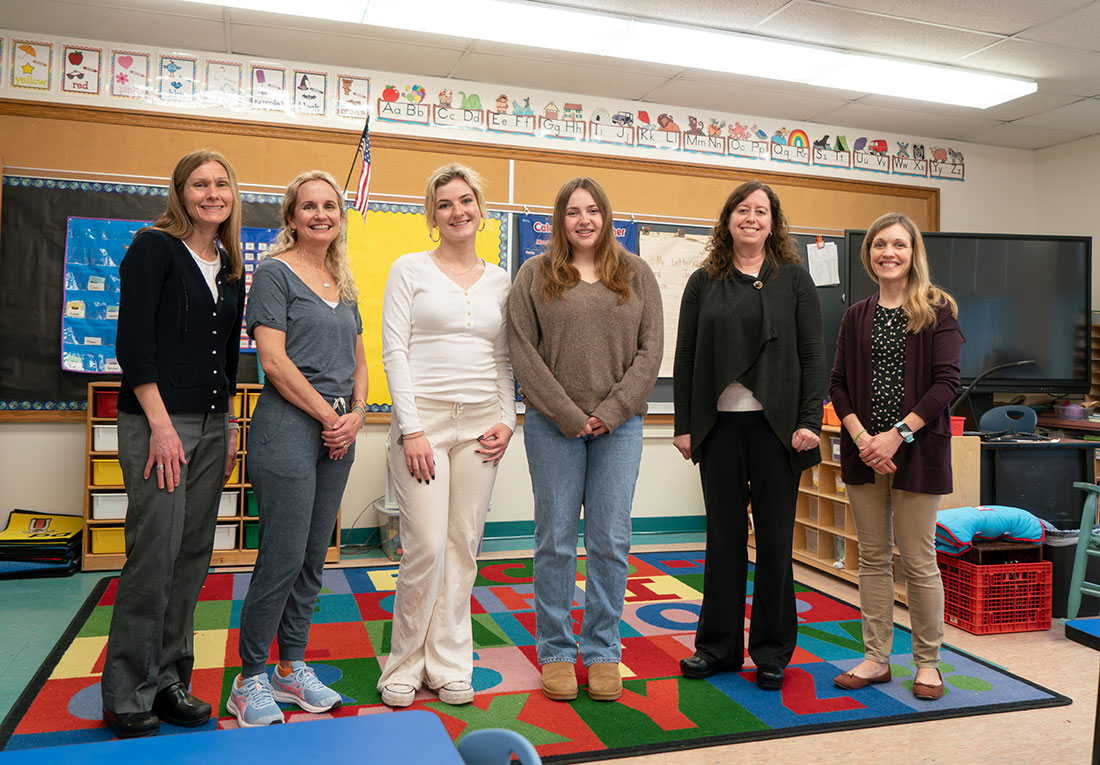
Cross-Disciplinary Team
The 4-year-olds aren’t the only students who are having fun while learning. The Syracuse University team is comprised of seven students, three undergraduate and four doctoral, who participate either at the elementary school or on the research team.
The team that visits the school includes Davis, a registered dietitian and second-year HDFS doctoral student; McCord, the social work major; and Rylee Pepper, a nutrition science major and Renée Crown University Honors Program student who’s minoring in psychology and biology.
Davis, who participated in the fall program, is back for the spring and delivers the weekly lessons along with Razza and Brann.
“My career goals are to pursue a position in teaching and research, focusing on child nutrition and the development of healthy eating behaviors,” Davis says. “This program fits into my area of research interest and I hope to learn from it and integrate aspects of it into my own future research.”
Pepper’s role this spring is to observe the lessons and complete a fidelity/tracking sheet that records the number of student and teacher participants, the lengths of sections within the lessons, and the completion of each component (the components include a review of the lesson from the previous week, a food-tasting activity, a story or song, homework if it was given, and if all planned material was covered). She also observes the engagement of the students and their teachers and the overall quality of the lesson.
“As (the children) become more comfortable with our team and the material, each week we see higher levels of participation and thoughtful recall and connections to our past lessons,” Pepper says. “Multiple students have shared with us their experiences with mindful eating at home through their homework assignments, showing they are developing a real interest in the topic.”
Although she has yet to decide on a specialty, Pepper wants to become a doctor and says the experience she’s getting with the Mindfully Growing team will be useful in whatever area she pursues.
“Learning to interact with these young students in a professional yet approachable manner is valuable experience for engaging with children as a doctor,” Pepper says. “Additionally, becoming familiar with the concept of mindful eating and how to teach members of the public at all ages about its benefits will prove helpful in a world where proper nutrition is becoming an increasing concern surrounding health.”
The other members of the student research team include Min Jin, a psychology major who has assisted with the development of support materials for the curriculum; Kelly Green Kearns, a counseling and counselor education doctoral candidate in Syracuse University’s School of Education whose cognate is humans’ interactions with food and wellness; Qingyang Liu, a HDFS doctoral student who helped deliver the lessons in the fall; Caitlin Smith, a HDFS doctoral student who assisted with the curriculum development; and Anna Waters, who earned her HDFS bachelor’s degree last spring and is now a graduate student in the Department of Marriage and Family Therapy in Falk College.
While earning her license in mental health counseling, Kearns worked with children in the field using Child-Centered Play Therapy. In the three years since the Mindfully Growing team was created, she has utilized her experience to help develop the program and she’s currently compiling results from surveys and focus groups.
“I’m starting my dream position as a tenure track professor at SUNY New Paltz next year and I’m excited to bring the findings from this program into the counseling field through teaching and future research,” Kearns says. “My dissertation is focused on the related topic of foodways and wellness for female undergraduate students, and I hope to study more populations in the future. My intention is to increase cross-disciplinary work to best inform counseling practice.”
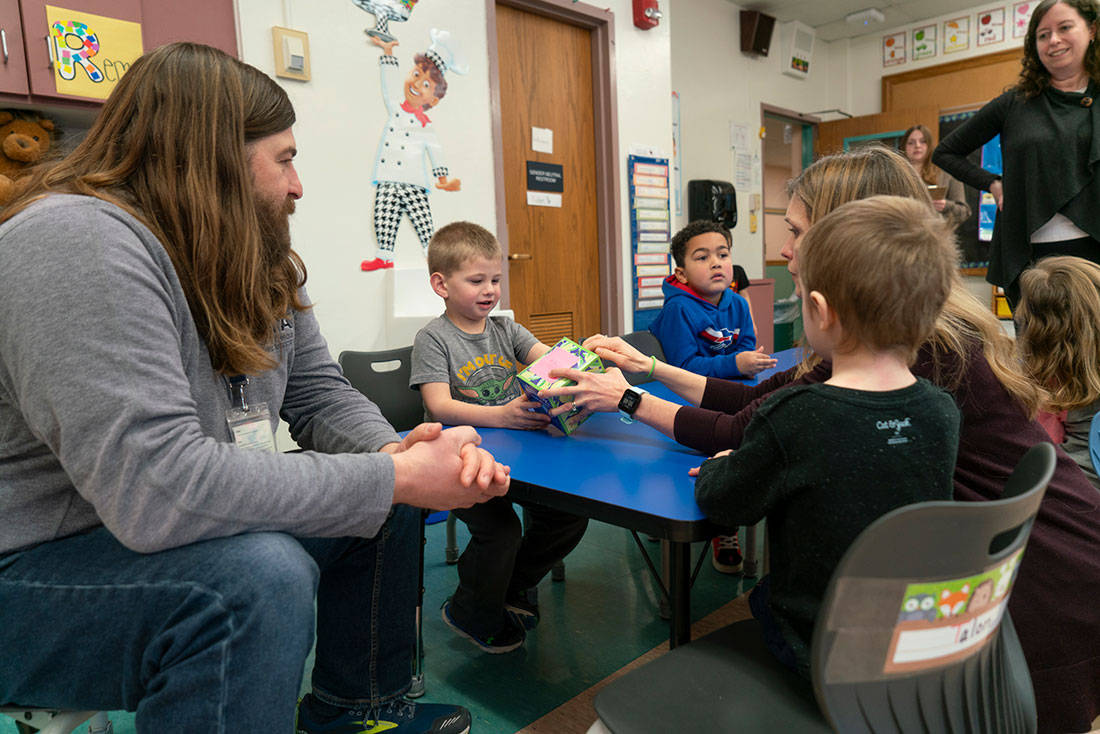
Growing the Program
On one Thursday morning in March, the 4-year-olds were completely engaged and enthusiastic, clapping and cheering whenever a new type of mystery food was pulled from the box. When they were asked about the beans that they had planted at home, one child said, “It’s going to grow into a big bean stalk!”
For the program to remain successful over the long run, the Syracuse team needs similar buy-in from teachers, administrators, and, most importantly, parents. To that end, the team created a series of three workshops for teachers and parents that focus on developing their own mindfulness and mindful eating practices as well as supporting the children’s practices.
“The classroom environment is an ideal place to create enthusiasm for such a program,” says MacLachlan, a UPK teacher since 2012 who has been with the district since 2000. “When kids are with their peers, they tend to get caught up in the group energy and naturally become enticed to remain open to new things.”
The team has been open to feedback, and Bastian says it has made modifications based on comments from teachers and parents. For example, this spring they separated the lessons by classroom (12 students each) rather than teaching to one large group. The team also added Zoom workshops for parents in addition to a weekly newsletter that provides additional resources to help them implement the program at home.
“What we’re seeing is interest by the parents, but they’re challenged by time,” Razza says. “That’s important information for us, too, when we think about how we ultimately want to move forward and how we can get this information to parents as easily as possible.”
Bastian and MacLachlan say they’d like to see the program continue beyond this school year to give the modifications time to take hold. From what they’re observing with the children, it’s clear the program is working.
“The need is so great in our country for a better understanding of the importance of healthy food,” MacLachlan says. “Childhood obesity, food-caused diseases, increased behavioral concerns, food insecurity, and all of the inaccurate information from the big food manufacturers can be a very confusing area for kids to navigate.”
The Syracuse team has been motivated by the success of the program in its first year and the possibilities it presents to use nutrition and mindfulness to create a healthier society.
“I’ve completed many tasks in the background of developing and improving the preschool lessons, all of which have helped me to develop my research skills and prepare me to complete an independent research project for my honors program thesis,” Pepper says. “Ultimately, I am hopeful for the results of our Jordan Elbridge lessons and I’m excited to see what the future holds for our team.”
For undergraduate students from across Syracuse University who want to learn more about the Mindfulness and Contemplative Studies minor from Falk College, please visit the course catalog webpage for information and course requirements.
